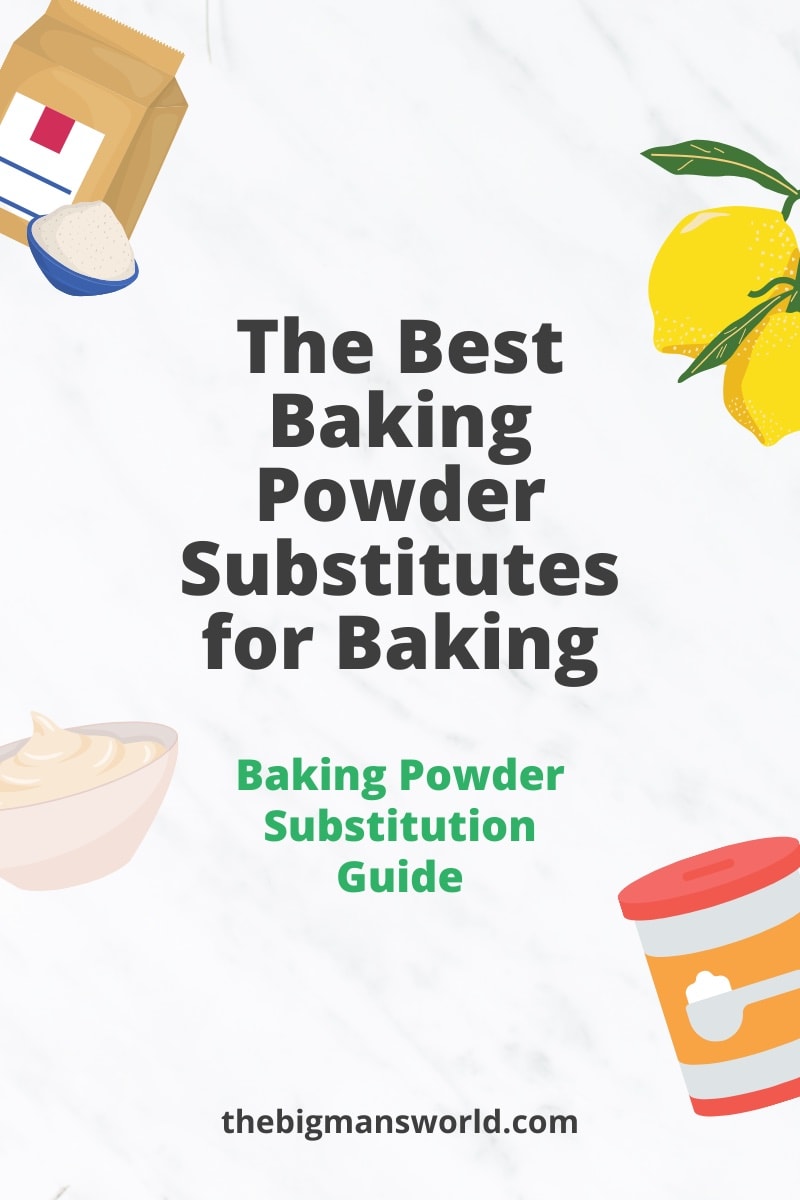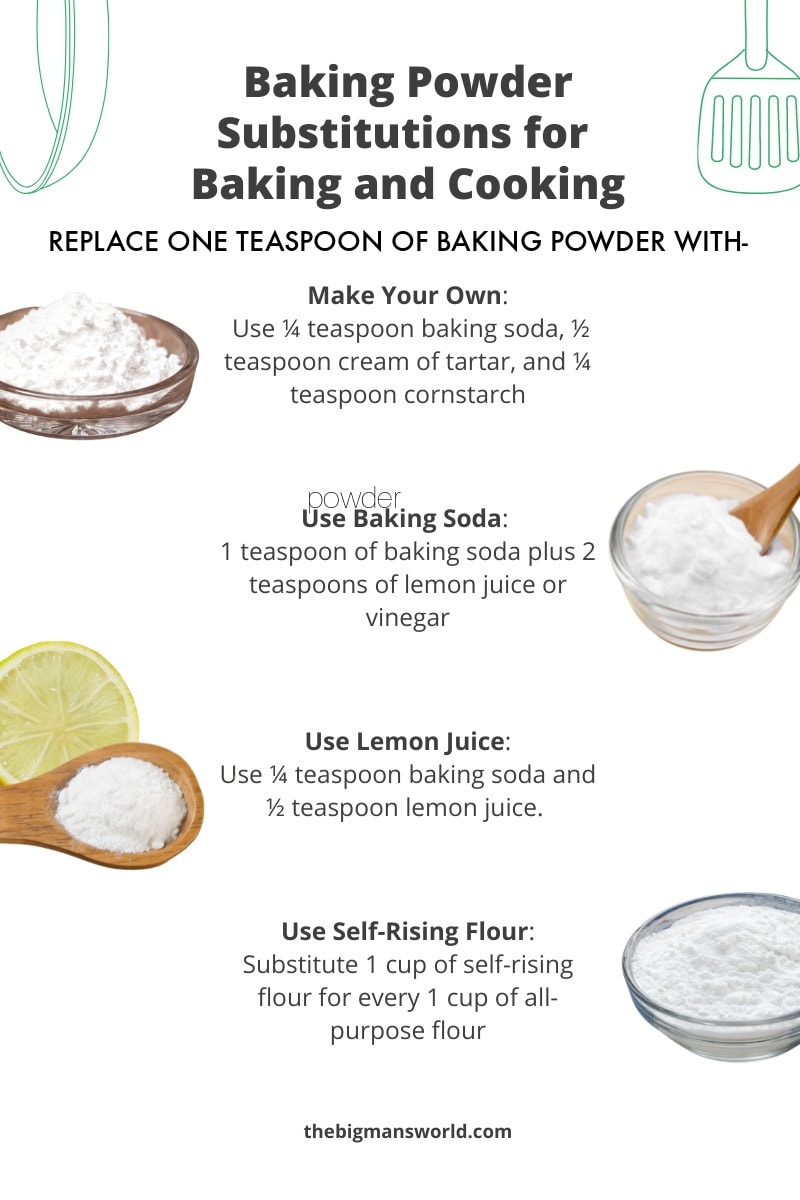This post may contain affiliate links. See my disclosure policy.
Run out of baking powder for a recipe and need a quick alternative? Learn which baking powder substitute works best for different baked goods.

Baking powder is an important ingredient in the baking process. There are, however, times when you might not have any on hand and are in the middle of a recipe. Trust me, I’ve been there.
Luckily, there are a surprising number of baking powder substitutes, but each has its best use. Knowing the perfect swap for baking powder can make or break your recipe.
Table of Contents
What does baking powder do?
Baking powder is a leavening agent used in baking. When introduced to wet ingredients, it increases the volume of the ingredients and lightens the texture of the finished baked goods.
This key ingredient is composed of three things:
- Sodium bicarbonate (a base)
- Cream of tartar (an acid)
- Cornstarch (a filler)
When baking powder is mixed with liquid, an acid-base reaction occurs between sodium bicarbonate and cream of tartar to release carbon dioxide gas. This results in the formation of bubbles that make the mixture rise.
So, when you don’t have any, you need something else to help cakes and breads rise and develop a fluffy, airy texture.
What can I use if I don’t have baking powder?
For those unfortunate days when the recipe calls for baking powder, but you don’t have quite enough in your pantry, these are the best baking powder substitutes.
Make your own
To make your own baking powder, you can pick and combine all the ingredients used to make the original baking powder. You’ll need cornstarch, baking soda, and cream of tartar.
To replace one teaspoon: use ¼ teaspoon baking soda, ½ teaspoon cream of tartar, and ¼ teaspoon cornstarch. To make an additional amount, double or triple the ingredients.
Works best for: Low-calorie muffins, protein cookies, and eggless banana bread.
Use baking soda
The main difference between baking soda and baking powder is the acidic component in the latter. To use baking soda as a substitute for baking powder, you must add an acidic component such as lemon juice or vinegar.
To replace one teaspoon: you’ll need 1 teaspoon of baking soda plus 2 teaspoons of lemon juice, white vinegar, apple cider vinegar, buttermilk, or plain yogurt.
Works best for: Vegan chocolate chip cookies, eggless pancakes, or flourless muffins.
Use lemon juice
Lemon juice also works wonders during baking. To substitute baking powder, you’ll need a lemon juice-baking soda mixture. Keep in mind this will alter the taste of the finished recipe, so it’s best reserved for desserts and baked goods with a citrus flavor component.
To replace one teaspoon: use ¼ teaspoon of baking soda and ½ teaspoon of lemon juice.
Works best for: Orange cake, lemon olive oil cake, or lemon loaf.
Use whipped egg whites
Sometimes, the recipe doesn’t need baking powder OR baking soda to get its rise. Whipped egg whites can be a creative way to introduce air into the batter, giving the baked good a natural rise.
To replace one teaspoon: use 2 whipped egg whites beaten to stiff peaks.
Works best for: Meringues, cloud bread, chiffon cake, or angel food cake.
Use self-rising flour
One great advantage of self-raising flour is that it comes with already-packed leavening agents. With this, you won’t need all-purpose flour or extra baking powder. Just use an equal ratio of 1 cup of self-rising flour for every 1 cup of all-purpose flour.
Works best for: Donut holes, protein bagels, or low-calorie bagels.

Frequently asked questions
If you don’t use baking powder, there won’t be any leavening agent, so your cakes or cookies will be flat and dense.
Both baking powder and baking soda have similar effects, helping the baked goods rise and create air bubbles. The biggest difference is that baking powder has baking soda AND an acidic element, usually cream of tartar. Baking soda requires an acidic ingredient to interact with to produce similar effects.
If you don’t have enough baking soda, the best substitute is using three times the amount of baking powder.
More helpful cooking resources

Baking Powder Substitute (3 Ingredients)
Ingredients
- 1/4 teaspoon baking soda
- 1/2 teaspoon cream of tartar
- 1/4 teaspoon cornstarch
Instructions
- In a small bowl, whisk all the ingredients together until combined.
- Use to replace one teaspoon of baking powder.
Notes
Nutrition
Originally published August 2022, updated and republished October 2024













